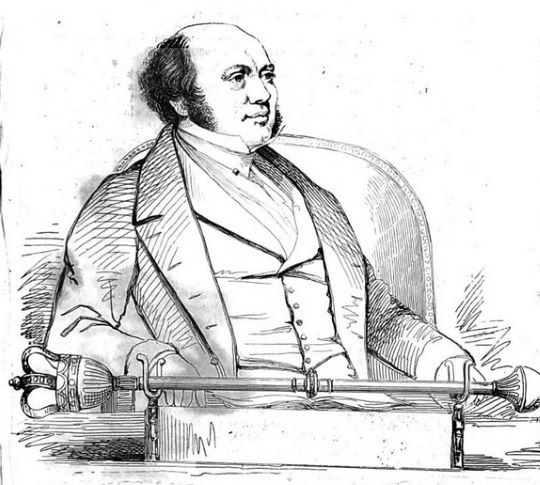- About MAA
- Membership
- MAA Publications
- Periodicals
- Blogs
- MAA Book Series
- MAA Press (an imprint of the AMS)
- MAA Notes
- MAA Reviews
- Mathematical Communication
- Information for Libraries
- Author Resources
- Advertise with MAA
- Meetings
- Competitions
- Programs
- Communities
- MAA Sections
- SIGMAA
- MAA Connect
- Students
- MAA Awards
- Awards Booklets
- Writing Awards
- Teaching Awards
- Service Awards
- Research Awards
- Lecture Awards
- Putnam Competition Individual and Team Winners
- D. E. Shaw Group AMC 8 Awards & Certificates
- Maryam Mirzakhani AMC 10 A Awards & Certificates
- Two Sigma AMC 10 B Awards & Certificates
- Jane Street AMC 12 A Awards & Certificates
- Akamai AMC 12 B Awards & Certificates
- High School Teachers
- News
You are here
Quotations in Context: De Morgan
“The moving power of mathematical invention is not reasoning but imagination.”
In January 1866, an obituary for the Irish mathematician and scientist William Rowan Hamilton appeared in The Gentleman’s Magazine, a monthly London periodical founded in 1731. The name of the obituary’s author was not provided in the magazine itself; however, when biographer Robert Perceval Graves published the third volume of his Life of Sir William Rowan Hamilton in 1889, he included some excerpts from the obituary and identified the author as Augustus De Morgan [Graves 1889, p. 216].

Photograph of De Morgan from frontispiece of Memoir of Augustus De Morgan, 1882.
Public domain, Internet Archive.
I found myself frequently bouncing back and forth between the works of De Morgan and Graves while researching this quotation. For example, at the end of the obituary De Morgan admitted to having drawn biographical details from an earlier article published in January 1842. Although De Morgan misidentified the source as Fraser’s Magazine, his statement that the article “is accompanied by a portrait” [De Morgan 1866, p. 134] as well as other details he provided identify the actual article as “Our Portrait Gallery No. XXVI: Sir William R. Hamilton” from The Dublin University Magazine, which was written by Graves.

Portrait of Hamilton, from The Dublin University Magazine, 1842. Public domain, Google Books.
I stumbled across another such connection in the January 4, 1884, edition of the weekly American journal Science. A review of the first volume of Graves’s Life of Sir William Rowan Hamilton clearly borrows from De Morgan’s obituary of Hamilton. For comparison, here is the relevant text from Science:
The name of William Hamilton has conferred a threefold distinction upon the kingdoms of Great Britain. An early article on the subject of this biography reminds its readers that each isle has its Sir William Hamilton. The Englishman was noted for his patronage of art, the Scotchman was among the first in philosophy, and the Irishman was among the first in mathematics [The Life of Hamilton 1884, p. 20].
And here is the related text from the obituary, where the “old article in a review” is Graves’s 1842 article (and it should be noted that De Morgan summarized the first paragraph of that article in his own words rather than copying it exactly):
An old article in a review, written on the subject of this memoir, reminds its readers that each of the three kingdoms has its Sir William Hamilton. The Englishman was noted for his patronage of art; the Scotchman was among the first in philosophy; and the Irishman was among the first in mathematics [De Morgan 1866, p. 128].
The subject quotation of this column appeared in the obituary when De Morgan discussed the difficulty of providing details of all of Hamilton’s life and work in a few pages:
Our notice of Hamilton’s scientific character must be brief: and it is not in our power to dwell on those parts which are not in evidence before the public. The scholar, the poet, and the metaphysician must be set forth in some large and well studied memoir, or not at all. Hamilton himself often said, “I live by mathematics, but I am a poet.” Such an aphorism may surprise our readers, but they should remember that the moving power of mathematical invention is not reasoning, but imagination. We no longer apply the homely term maker in literal translation of poet: but discoverers of all kinds, whatever may be their lines, are makers; or, as we now say, have the creative genius [De Morgan 1866, p. 132].
Since De Morgan did not live to see Graves’s three-volume biography published, we can only wonder if De Morgan would have found it a satisfactory response to his call for a “large and well studied memoir” of Hamilton.
References
De Morgan, Augustus. 1866, January. Sir W. R. Hamilton. The Gentleman’s Magazine 1: 128–134.
Graves, Robert Perceval. 1842, January. Our Portrait Gallery No. XXVI: Sir William R. Hamilton. The Dublin University Magazine 19(119): 94–110.
Graves, Robert Perceval.1889. Life of Sir William Rowan Hamilton. Vol. 3. Dublin: Hodges, Figgis & Co.
The Life of Hamilton. 1884, January 4. Science 3(48): 19–23.
“Quotations in Context” is a regular column written by Michael Molinsky that has appeared in the CSHPM/SCHPM Bulletin of the Canadian Society for History and Philosophy of Mathematics since 2006 (this installment was first published in May 2018). In the modern world, quotations by mathematicians or about mathematics frequently appear in works written for a general audience, but often these quotations are provided without listing a primary source or providing any information about the surrounding context in which the quotation appeared. These columns provide interesting information on selected statements related to mathematics, but more importantly, the columns highlight the fact that students today can do the same legwork, using online databases of original sources to track down and examine quotations in their original context.
Michael Molinsky (University of Maine at Farmington), "Quotations in Context: De Morgan," Convergence (September 2024)




